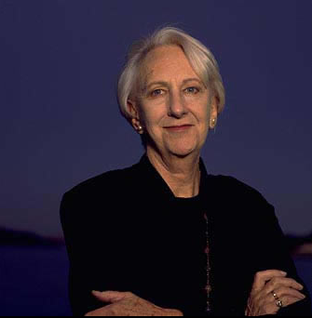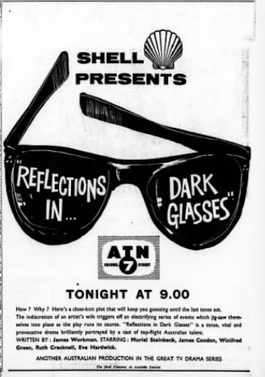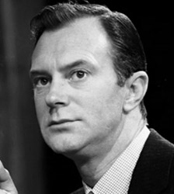Related Research Articles
Mother and Son is an Australian television sitcom that was broadcast on the Australian Broadcasting Corporation (ABC) from 16 January 1984 until 21 March 1994. The show stars Ruth Cracknell, Garry McDonald, Henri Szeps and Judy Morris. It featured many Australian actors of the time in guest roles. It was created and written by Geoffrey Atherden. Its theme song features the Tasmanian Symphony Orchestra, playing I Want a Girl , a jazz standard which was recorded by Al Jolson in the 1920s.

Ruth Winifred Cracknell AM was an Australian character and comic actress, comedienne and author, her career encompassing all genres including radio, theatre, television and film. She appeared in many dramatic as well as comedy roles throughout a career spanning some 56 years. In theatre she was well known for her Shakespeare roles.
Garry George McDonald AO is an Australian actor, satirist and comedian. In a career spanning five decades he has had many theatre, television and film roles, and has been listed as a National Living Treasure. He is best known as the seemingly naive celebrity interviewer Norman Gunston, through whom he pioneered the "ambush interviewer" technique since followed by many others. He received a Gold Logie award for the television Norman Gunston Show in which he developed the character. He is also famed for his role of the hapless Arthur Beare in the television sitcom Mother and Son. Appointed an Officer of the Order of Australia in 2003 for service to the community in the mental health field and to the arts as an entertainer, he has also been a board member of the Australian mental health organisation Beyond Blue.

June Marie Salter AM was an Australian actress and author prominent in theatre and television. She is best known for her character roles, in particular as schoolteacher Elizabeth McKenzie in the soap opera The Restless Years and for her regular guest appearances in A Country Practice as Matron Hilda Arrowsmith.
Alice to Nowhere is a 1986 Australian miniseries set in the outback in 1954. The title refers to Alice Springs, a town in the centre of the country. The plot involves a nurse and a pair of ruthless jewel thieves.

Australian comedy refers to the comedy and humour performed in or about Australia or by the people of Australia. Australian humour can be traced to various origins, and today is manifested in a diversity of cultural practices and pursuits. Writers like Henry Lawson and Banjo Paterson helped to establish a tradition of laconic, ironic and irreverent wit in Australian literature, while Australian politicians and cultural stereotypes have each proved rich sources of comedy for artists from poet C. J. Dennis to satirist Barry Humphries to iconic film maker Paul Hogan, each of whom have given wide circulation to Australian slang.

"Reflections in Dark Glasses" is an Australian television film, or rather a television play, which aired in 1960. It aired as part of Shell Presents, which consisted of monthly presentations of stand-alone television dramas. It was written by Sydney writer James Workman, and is notable as an early example of Australian-written television drama. It was broadcast live in Sydney on 6 February 1960, then recorded and shown in Melbourne.
Michael Boddy was an English-Australian actor and writer. His best known works include co-writing the play The Legend of King O'Malley with Bob Ellis.
Patricia Mary Byson Flower was an English Australian writer of plays, television plays and novels.

The Life and Death of King Richard II was a 1960 Australian live TV production of the play by William Shakespeare directed by Raymond Menmuir. It aired on 5 October 1960 and was one of the most elaborate productions made for Australian TV at that time.
The Little Woman is a 1961 Australian comedy TV play written by Patricia Hooker and broadcast on the ABC.
The Cell is an Australian play by Robert Wales. The setting is in a school for delinquent girls.
Australian Plays is a 1969-1970 Australian anthology TV drama series that aired on the ABC. It consisted of six original Australian dramas.
"Fiends of the Family" is a 1969 Australian television play. It was part of the Australian Plays series. Written by Pat Flower based on her 1966 novel, directed by Oscar Whitbread.

The Cousin from Fiji (1945) is a novel by Australian writer and artist Norman Lindsay.
"The Concert" is a 1961 Australian TV GTV-9's Melbourne studios. It was directed by Rod Kinnear. Australian TV drama was relatively rare at the time. The episode aired on 3 June 1961 in Melbourne, and on 10 June 1961 in Brisbane.
Patricia Anne Crocker professionally known as Patti Crocker, was an Australian actress associated with the "golden days of radio in Australia", who also appeared in theatre and on television, primarily in soap opera and commercial advertisement's. She was the author of a memoir detailing her life and career on both radio and subsequently on television.
Split Level is a 1964 Australian TV play directed by Ken Hannam and written by Noel Robinson. It aired on 7 October 1964 and was shot in Sydney at ABC's Gore Hill Studios.
John Croyston was an Australian writer, radio producer and director.

Ric Hutton (1926–1996) was an Australian actor. He worked in Britain, Australia and the United States of America. He was best known in Australia as the voice of "Black Jack Seager" in the hit radio series The Castlereagh Line written by Ross Napier.
References
- ↑ "TV Guide". Sydney Morning Herald. 10 November 1969. p. 15.
- 1 2 Hall, Sandra (15 February 1969). "Who's filming what". The Bulletin. p. 42.
- ↑ "Gilmore prize presented". Tribune . No. 1551. New South Wales, Australia. 27 March 1968. p. 8. Retrieved 18 February 2019– via National Library of Australia.
- ↑ ""Tilley" lands Gilmore TV prize". Tribune . No. 1544. New South Wales, Australia. 7 February 1968. p. 8. Retrieved 18 February 2019– via National Library of Australia.
- ↑ "Tilley lands flat". Sydney Morning Herald. November 16, 1969. p. 126.
- ↑ "Safe, steady 1969". Sydney Morning Herald. 28 December 1969. p. 77.
- ↑ Lever, Susan. "Governors and Convicts: a television staple". Academia.edu.au.